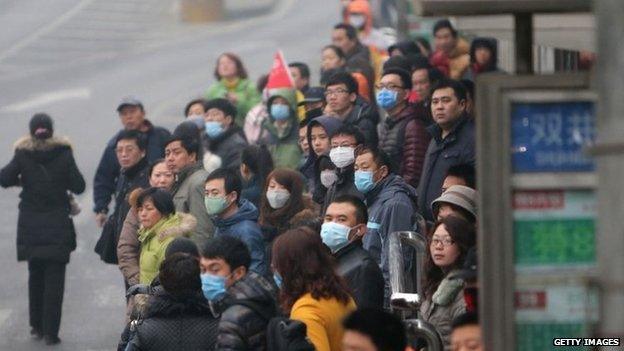Understanding the politics of Chinese smog
- Published

One study says that air pollution causes more than 1.2 million premature deaths a year in China
The China blog has featured pollution more than once this week - and we make no apologies for that. The pollution currently blanketing northern China is an extraordinary and unnatural phenomenon.
The air quality is so bad it's comparable to living near a forest fire. The scale of the consequences to human health are only beginning to be understood. Air pollution is thought to cut life expectancy in northern China by five years compared to the south of the country. estimated pollution caused 1.2 million premature deaths a year in the country - and the real impact may be even worse than those figures suggest.
This is certainly an environmental disaster and a public health crisis. But it also has the potential to become a huge political problem.
After years of denying the issue really existed, the central government has recently accepted that pollution is of genuine concern. It now publishes figures for the air quality in China's major cities (the accuracy of some is still contested), and in 2013 promised $275bn (ВЈ165bn) to tackle the issue in the next five years, setting targets for air quality improvements.
The ҙуПуҙ«ГҪ's Martin Patience points out Beijing's tallest skyscraper - hidden by smog
'Real victims'
This shift in government stance has come in part because pollution is getting worse but also because of a change in the public awareness of environmental issues. As poverty recedes into the past for millions in China, health is now becoming more important than wealth. And they expect the government to act.
A newspaper in northern China has this week reported what appears to be the first case of an individual suing the government for failing to curb air pollution. The Yanzhao Metropolis Daily newspaper quoted the complainant, Li Guixin from Shijiazhuang, as saying "the reason I'm proposing compensation is to let every citizen see that amid this haze, we're the real victims".
China has lifted hundreds of millions out of poverty; it's also shifted their priorities. The government has now pledged to reduce pollution, and in so doing has raised expectations.
The political risk for the Communist Party comes if those expectations are not met. Unlike other government promises, people will be able to judge success and failure on pollution simply by looking out of their window.
China now publishes figures for air quality in major cities
And the scale of the problem is enormous. China's pollution crisis has been a long time coming. The reliance on coal, the rise of the car, along with the soaring energy demand of an ever-growing economy, have all meant more dirty air. Predictably so. Reducing pollution will require wholesale structural change, not just in how and where energy is produced, but how it is priced.
It will probably mean sacrificing some economic growth in favour of quality of life. To do all of that will mean confronting some of the most entrenched vested interests in China's economy, and inside the Communist Party itself.
How the pollution issue is handled in the next few years will tell us a lot about China's government, its changing relationship to its people, and its ability to make difficult decisions.